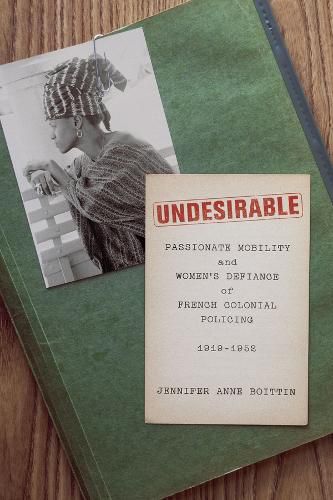Readings Newsletter
Become a Readings Member to make your shopping experience even easier.
Sign in or sign up for free!
You’re not far away from qualifying for FREE standard shipping within Australia
You’ve qualified for FREE standard shipping within Australia
The cart is loading…






Archival research into policing and surveillance of migrant women illuminates pressing contemporary issues.
Examining little-known policing archives in France, Senegal, and Cambodia, Jennifer Boittin unearths the stories of hundreds of women labeled undesirable by the French colonial police in the early twentieth century. These undesirables were often women traveling alone, women who were poor or ill, women of color, or women whose intimate lives were deemed unruly. To refute the label and be able to move freely, they spoke, or wrote impassioned letters, with some emphasizing their undesirable qualities to suggest that they needed the care and protection of the state to support their movements and others using the empire’s own laws around Frenchness and mobility to challenge state interference. Tacking between advocacy and supplication, these women summoned intimate details to move beyond, contest, or confound surveillance efforts, bringing to life a practice that Boittin terms passionate mobility. In considering how ordinary women pursued autonomy, security, companionship, or simply a better existence in the face of surveillance and control, Undesirable illuminates pressing contemporary issues of migration and violence.
$9.00 standard shipping within Australia
FREE standard shipping within Australia for orders over $100.00
Express & International shipping calculated at checkout
Archival research into policing and surveillance of migrant women illuminates pressing contemporary issues.
Examining little-known policing archives in France, Senegal, and Cambodia, Jennifer Boittin unearths the stories of hundreds of women labeled undesirable by the French colonial police in the early twentieth century. These undesirables were often women traveling alone, women who were poor or ill, women of color, or women whose intimate lives were deemed unruly. To refute the label and be able to move freely, they spoke, or wrote impassioned letters, with some emphasizing their undesirable qualities to suggest that they needed the care and protection of the state to support their movements and others using the empire’s own laws around Frenchness and mobility to challenge state interference. Tacking between advocacy and supplication, these women summoned intimate details to move beyond, contest, or confound surveillance efforts, bringing to life a practice that Boittin terms passionate mobility. In considering how ordinary women pursued autonomy, security, companionship, or simply a better existence in the face of surveillance and control, Undesirable illuminates pressing contemporary issues of migration and violence.